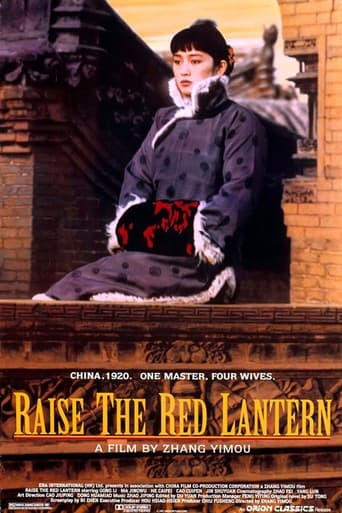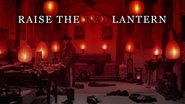oktjabr
Raise the Red Lantern is masterful piece of film history.A bleak tale of sexual subjugation and ruthless scheming in a single opulent household in 1920s China, Raise the Red Lantern portrays four women locked in struggle for attention from the master of the house, who every day favours one of his concubines with special honour of spending a night with him. And as usual among the hereditary nobility, the highest achievement is pregnancy resulting a male child.The tense plot is perfected by the backdrop of suffocating ancient mansion built out of dull bricks and adorned expensively with etchings and drapery, and staffed with servants. The watcher barely gets a glimpse of the outside world as if nothing even existed outside the walls of the compound where the women are imprisoned in concubinage. And almost as faceless is the master himself, whose face we never see in close up shot.Cinematography and set building stand out as excellent, with stark reds of the drapery and lanterns, contrasting with the muted greys of the mansion itself, later covered by a blanket of snow.
justinnaaz
This movie is like a piece of westernised Chinese food which added lots of sugar to flatter white people's taste. Unfortunately,it is totally fabricated and make no sense to me as a Chinese. The sugar here is the complicated sexual relationship; whimsical concocted costume,raising the lanterns in the front of mistress is a joke to me ; and slanted eyes main characters, exactly catering the white people's stereotypical view of Asian. I have nothing against director yimou and gong li. As a matter of fact I prefer their other film which called to live. However, if you do not understand Chinese history and China very well you probably do not enjoy this film as you do not know the meaning behind.
Johan Dondokambey
The story itself is a common clichés found in the 80s and 90s Hong Kong made serial TV dramas but which usually tells about royal families instead. Zhang Yimou and the movie's creators nicely simplify those settings into the mid-level social class of a wealthy man .But despite this simplification, the intrigue gets even more focused and emphasized. The feel of the artsy movie with lots of long shot zooms and still moments instead supports the drama and made the movie's pace really enjoyable. I felt that the two-hour duration was nicely bearable since the movie piece in its puzzle pieces nicely and still keeps the ending quite unpredictable despite the story contains a lot of clichés about harem and the intrigue inherent in it. The acting overall is a little bit above standard. Gong Li did okay in her performance here although she really had to work more on her expressions.
kurosawakira
Zhang Yimou's film "Da hong deng long gao gao gua" (1991) has become one of my few safehavens: a film I retreat to when I return from my film adventures and long for refreshment. What I like the most is how this is shot, that is, With such discipline: the shots are highly symmetrical, either horizontally or in depth, and often than not in depth. It's amazing, and shows what three-dimensional filmmaking really is all about. I talk of discipline, since they could have shot each scene the ordinary way, going far closer than they do, but instead they step back and let the space of the place suck you in. This creates a wonderful sense of loneliness in the context of the film, and the closeups then have added power.Speaking of which, this has somewhat ousted another architecturally brilliant film from the same year (1991), just as radical if not more in its use of space, but a lot tougher to sit through. The same with sound: the contrapuntal dance of sounds and silence, just like that of long shots and closeups, beautifully emphasizes the few important motifs that the soundscape offers us.But the riches of the film far transcend only the technical, no matter how reinvigorating and masterful they be. Songlian's marriage, as demonstrated by the first scene, is actually an act of rebellion towards her mother and the values her mother represents. Dramaturgically there is an unexpected symmetry there, since when she gets to the house, she finds that all the women do just that, rebel and play the game with far greater ruthlessness than her.Indeed, the film plays out just like a game of light. The lanterns are lit, they change houses, with it all the perceived authorial power in the game (I think this aspect is occasionally misinterpreted as melodrama). But it wouldn't have worked without Gong Li, who is lovable, beautiful and subtle enough so that in the end we start reading our own projections and assumption on her face.As far as I know, there isn't a decent Blu-ray of the film in existence. I own a French Blu-ray, which is unfortunately not of a very good quality, and might pose problems for people who don't know French (or Mandarin!), since it's the only subtitle option available.



